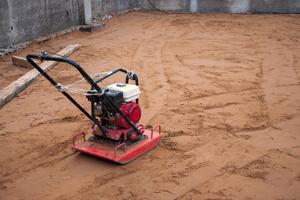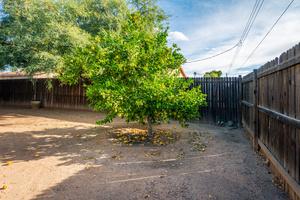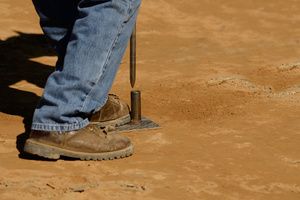Soil compaction can lead to a host of problems in a yard and garden, from preventing plants access to the water, air and nutrients they need to creating drainage issues. Here is a closer look at what is involved in soil compaction and the top areas in your yard where you may experience this issue.
What Is Soil Compaction?
Soil compaction takes place when the particles of soil are pressed very closely together. This reduces the space between the particles and increases the density of the soil. It can change many of the soil’s properties and functions at the biological, chemical and physical levels.

One of the biggest concerns in soil compaction is the loss of adequate space between particles, impairing the movement of water and air, thereby preventing plants from growing. Plant roots struggle to grow in compacted soil, and this can affect not only crops but also landscape vegetation and pastures. In highly compacted soil, the roots of plants may not be able to develop the force needed to break through the soil.
Soil compaction is also troubling to the organisms that live within the soil. The reduced pore size makes it difficult for organisms that are higher up in the food chain to perform their typical activities. For example, it can make it difficult for earthworms and ants to dig through the soil so they can find food to survive or create burrows. In addition, these organisms may struggle to get the air and water they need, which could cause them to perish.
Therefore, to protect the time, money and effort that you have invested in your home’s landscape and gardening, it is important to be aware of soil compaction. Learn more about where compaction can occur and how you can minimize or prevent it.
Areas With Recurring Vehicle Traffic
One of the most obvious places where you may experience soil compaction is places where there is regular vehicle traffic. For example, if there is a space in your yard that you regularly drive over to park your car or an area where you keep a boat that is occasionally towed to the waterway, the soil in this area can be compacted fairly quickly thanks to the weight of the vehicles. This may be obvious in the form of persistent tire ruts, or it may be more subtle.
Areas With Frequent Foot Traffic
Although vehicles may create significant soil compaction rather quickly, foot traffic can also compact soil over time. Therefore, if there is a specific path in your yard that you frequently take, such as a path from a swimming pool to an outdoor bathroom, you should check the area for signs of soil compaction from time to time.
In gardens, this is a major problem for those who tend to stand in the same position surrounding their plants while watering and weeding. Frequently placing the weight of your body over one particular area day after day can compact the soil.
Areas Where Vegetation Is Lacking

Sometimes compaction will not be as obvious as it may be in footpaths or tire tracks. Another telltale sign that soil could be compacted is an area that is lacking vegetation, such as bald spots in the lawn. Exposed roots or shallow roots can also indicate that the soil is compacted as the roots are unable to move through the spaces within the soil.
Be particularly vigilant in areas where trees are becoming encircled by their own roots as these roots can eventually strangle the tree and cause it to die. This will depend on the species, however, as trees such as ash and maple do have naturally shallow root systems that tend to grow close to the surface of the soil regardless of its compaction levels.
Areas Where Water Pools In The Yard
If you notice water pooling on the surface of the soil in certain spots, it could mean that water is unable to infiltrate the soil because it is too compacted. This problem is not always caused by compaction, however, as soils with a high content of clay can also experience compromised permeability.
What To Do If You Suspect Your Soil Is Compacted
If you believe part of your yard is experiencing soil compaction, dig up a small amount of dirt using a shovel. It is important to dig up soil that is moist as dry soil always seems harder; avoid using muddy soil. The optimum time for this check is a couple of days after watering the yard or rainfall.
If you find that your moist soil is difficult to dig through or break up, there is a good chance that it is compacted. While you are digging, any sign of surface crusting or a soil structure that looks like a stack of plates can also be an indication of soil compaction.
A probe can be used to confirm soil compaction. You can use a wire flag, or you can purchase a dedicated probe for this purpose. If you are able to push it to a depth of a foot or more, the soil is likely not compacted. If you can push the wire into the soil between 4 and 12 inches deep without bending, the soil is considered fair. However, if you notice the wire bending at less than four inches, the soil is poor and compacted.
Ways To Prevent Soil Compaction

If possible, vary the places that you walk in the yard so that no single area is subjected to heavy footfall. Alternatively, you can consider placing stepping stones or pavers and ensure that all of the walking in the yard is restricted to these paths. Instruct everyone else who uses the yard to avoid walking in other areas.
You might also consider adding stepping stones. Although they do compact the soil to a mild extent, they also distribute your weight across a broader surface area, minimizing the impact of footfall. The space underneath these stones is also a great habitat for beetles, worms and other organisms that help aerate your soil.
Raised garden beds with fencing can also be useful for those who are concerned about stepping too close to their garden, as well as those with children or pets.
Get In Touch With The Soil Experts
If you are concerned about the condition of your soil, get in touch with the soil experts at Dirt Connections. We can answer all of your soil-related questions and deliver a range of high-quality soils suited to different types of projects to homes and businesses in the Northern Virginia area.
Summary

Dirt Connections was started with one goal in mind: providing quality residential and commercial construction services to clients on time and on budget. Reach out for more information on how we can support your next project.
For your convenience our estimates are free and by appointment. Call 703-940-9949 for a free estimate today!










































